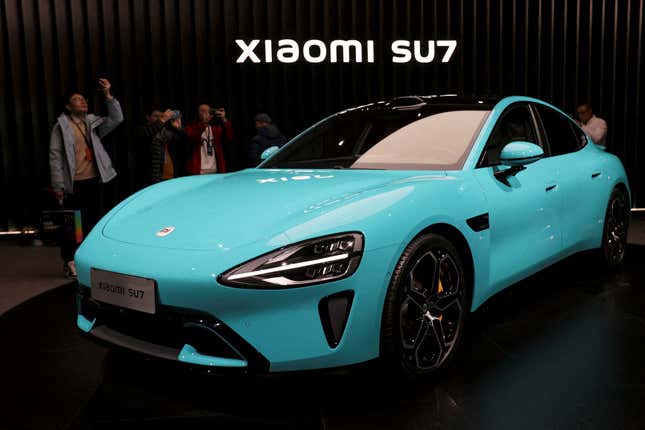
Getting into the car-making business, especially when it comes to electric vehicles, is no simple task — just ask Apple. But Xiaomi, a Chinese technology giant known primarily for its smartphones, is notching milestone after milestone.
On Monday, CEO and founder Lei Jun announced that Xiaomi had produced 10,000 units of the SU7, a tech-heavy electric sedan, after just 32 days of production. He’s previously said that Xiaomi’s Super Factory in Beijing can build 40 cars every hour, which comes out to one new SU7 every 76 seconds.
More than 700 robots reportedly operate in the factory; 381 of those robots are deployed in the body shop alongside 20 employees. This allows Xiaomi to assemble parts to the car body in under 30 seconds, or about twice as fast as traditional automakers, the company claims. That strategy, Xiaomi says, allows it to be three times more efficient than if it employed only human workers.
Efficiency is something Xiaomi desperately needs if it wants to fill the rush of orders it received for the SU7. Within 24 hours of its March 28 launch event, Xiaomi notched 88,898 pre-orders in China.
As of last week, Xiaomi had secured more than 70,000 locked-in orders. Depending on the model they purchased, customers are expected to wait between 18 and 30 weeks for their new EVs.
Enthusiasts have been eager to pick up a SU7, both because of its novelty and its capabilities.
According to Lei, the SU7 outperformed Tesla’s Model 3 in all but two aspects. The base model SU7 costs 215,900 yuan ($29,900) compared to the Model 3's 231,900 yuan ($32,000) sticker price after a series of cuts from the U.S. automaker. More expensive models of the SU7 can reach up to 299,900 yuan ($41,496) and are intended to compete with Porsche’s electric Taycan.
Xiaomi has pledged to invest $10 billion to produce cars over a decade. Last year, it became one of the few new players in China’s EV market to win government approval. Lei said in December that the company aims to become a top global carmaker in 15 to 20 years.
But not everything is smooth sailing for Xiaomi. Several videos of test cars crashing have landed on social media, discouraging potential customers. In most cases, the drivers pushed too heavily on the acceleration, which causes the SU7 to lose traction and crash.